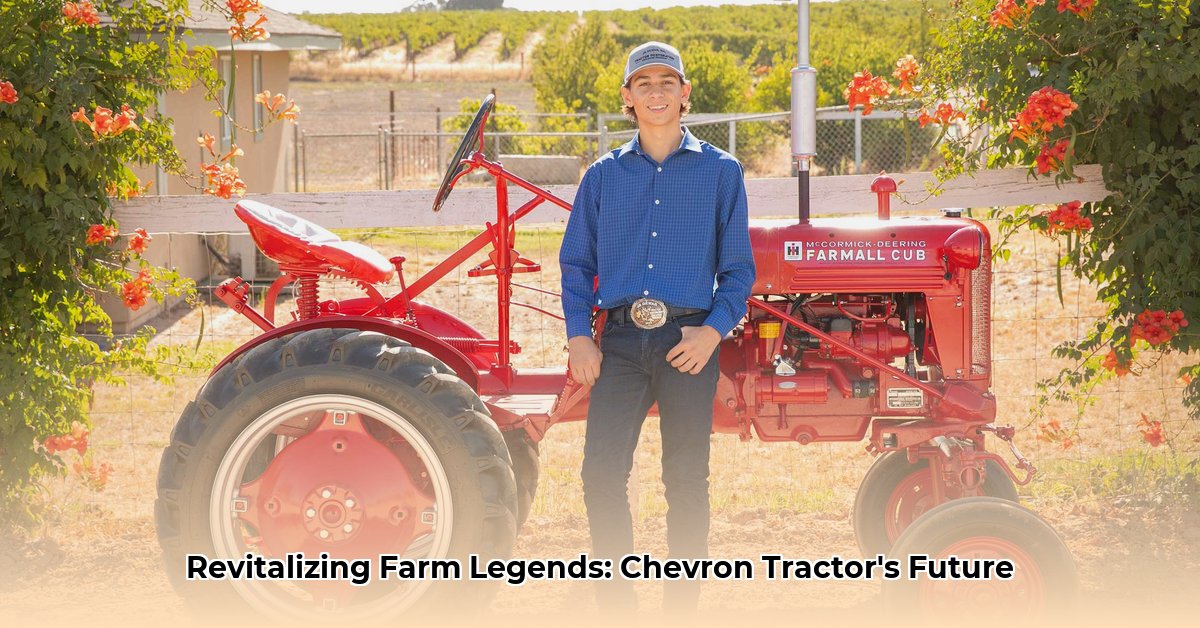
Revitalizing Machines, Revitalizing Careers
For a quarter-century, the rumble of meticulously restored engines and the satisfying clang of wrenches have echoed through the Chevron Tractor Restoration Competition (TRC). This isn't merely about fixing old farm equipment; it's a dynamic program shaping the future of agriculture, one well-oiled tractor at a time. It uniquely blends hands-on learning, intense competition, and a genuine passion for preserving agricultural heritage—all rolled into an incredible experience for high school students. The results have been truly inspiring. How has this program managed to achieve such remarkable impact? Let's delve into the details. For more information on similar programs, check out these tractor deals.
More Than Just Grease and Gears: A Masterclass in Real-World Skills
Participants in the TRC aren't just turning wrenches; they're developing a comprehensive skillset crucial for success in any field. Imagine juggling a complex budget, leading a team, and troubleshooting intricate mechanical problems—all while facing a tight deadline. That's the reality of the TRC. Students hone their project management abilities, master the intricacies of teamwork, and develop creative problem-solving skills—all while working on these magnificent machines. This isn't just about fixing a tractor; it’s about building valuable, transferable life skills. Isn't this a more effective approach to vocational training than traditional classroom settings?
Hands-On History: A Tactile Education in Agricultural Heritage
This isn't some theoretical classroom exercise. These students are working on real, vintage tractors, tackling actual mechanical challenges. They learn to diagnose problems, source parts (often a challenge in itself!), and meticulously restore these impressive pieces of agricultural history to their former glory. It's a deeply satisfying, hands-on education that instills a profound appreciation for the history and ingenuity behind farming technology. The sense of accomplishment upon completing a TRC restoration is immense; a testament to their dedication and hard work. They're not just fixing machines; they're connecting with the past to build a better future. What other programs offer this unique blend of practical skills and historical appreciation?
The Power of Mentorship: Guidance Beyond the Garage
The TRC is more than tractors and tools; it's a vibrant community built on mentorship. Experienced professionals from the agricultural and automotive worlds generously share their expertise, guiding these young people through the competition's challenges. These mentors build lasting relationships with the students, providing valuable guidance, fostering confidence, and helping them navigate both triumphs and setbacks. They act as advisors, celebrating successes and offering support during tough times. This network of mentorship extends far beyond the competition itself, creating a lasting impact on the students' lives. What is the measurable effect of this comprehensive mentorship program on student outcomes?
Beyond the Prize Money: Reaping the Rewards of Hard Work
While the $20,000 prize pool offers significant financial incentives, encouraging dedication and creativity, the true rewards of the TRC extend far beyond monetary gain. The skills gained—technical expertise, teamwork, project management—are highly sought-after in a diverse range of industries, making graduates of the program highly competitive in the job market and highly attractive to college admissions officers. These are skills that truly pay dividends for a lifetime. How does the TRC's success rate in student job placement and college acceptance compare to national averages?
Sustainable Solutions: A Green Approach to Agriculture
The TRC aligns perfectly with the growing global focus on sustainable agriculture. Restoring older, durable tractors actively promotes environmental responsibility. By extending the life of existing machinery, the competition reduces the demand for new manufacturing, minimizing the environmental impact associated with production and transportation. It's a practical demonstration of sustainable practices, showing these future leaders a real-world example of environmentally conscious choices within the agricultural sector. This hands-on experience is likely to greatly influence their future careers. How much carbon emission reduction can be attributed to the TRC's activities?
The Future Farmers: Cultivating Tomorrow's Leaders
The Chevron Tractor Restoration Competition is about more than just fixing old tractors; it's about cultivating the next generation of agricultural leaders. These students are not just skilled mechanics; they’re thoughtful problem-solvers, dedicated stewards of the land, and passionate advocates for sustainable practices. They represent the future of agriculture, well-equipped to embrace the challenges and opportunities that lie ahead. They are the innovators, the problem-solvers, and future leaders the agricultural industry so desperately needs. How can we ensure that programs like the TRC continue to thrive and expand their reach?
How to Replicate the Chevron Tractor Restoration Competition’s Success
Key Takeaways:
- The Chevron TRC successfully cultivates essential skills for future agricultural leaders through hands-on restoration projects and business acumen development.
- The program’s 25-year history demonstrates a unique learning ecosystem impacting student skill sets and community engagement.
- Replicating this success requires a multi-faceted approach focusing on skill development, community involvement, and long-term impact assessment.
This case study of the Chevron Tractor Restoration Competition demonstrates a powerful model for vocational training and community engagement within the agricultural sector. The program’s lasting impact on participants and the wider community highlights the potential of combining practical skills development with a deep appreciation for history and sustainability.